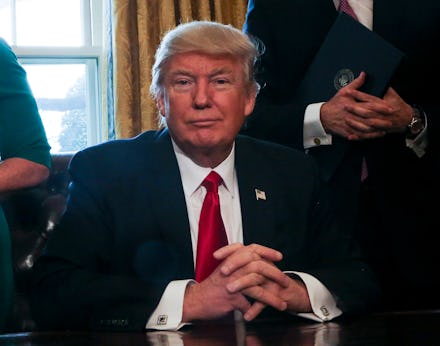Sean Spicer said Trump's order isn't a ban — has he been reading Trump's tweets?

Earlier this week, White House press secretary Sean Spicer lambasted the media for calling President Donald Trump's executive order, which bars nearly all refugees as well as nationals of seven Muslim-majority nations from entering the U.S., a ban.
"It's not a Muslim ban. It's not a travel ban," Spicer told reporters. "It's a vetting system to keep America safe."
Spicer's boss, the president, has spent much of the ensuing days undermining that defense.
On Twitter alone, the president repeatedly referenced his "ban," which was temporarily halted nationwide by a court ruling on Friday. Trump at first seemed to equivocate on what to call the order before posting people should call it what they want. He, however, seems to have settled on"ban," since he's used it on Twitter at least three times since Spicer's press conference.
Semantics aside, Trump clearly intended the executive order as a de facto ban on Muslims. Former New York City Mayor Rudy Giuliani said Trump initially came to him to talk about the "ban" and show him "the right way to do it legally."
It's hardly the first time — and certainly unlikely to be the last — Trump or administration officials have gone off message. In a statement last week, Spicer defended Trump's decision to terminate acting Attorney General Sally Q. Yates, who refused to defend the order in court, by insisting his order was "not extreme." Yet Trump himself has referred to the policy as "extreme vetting" almost continually.